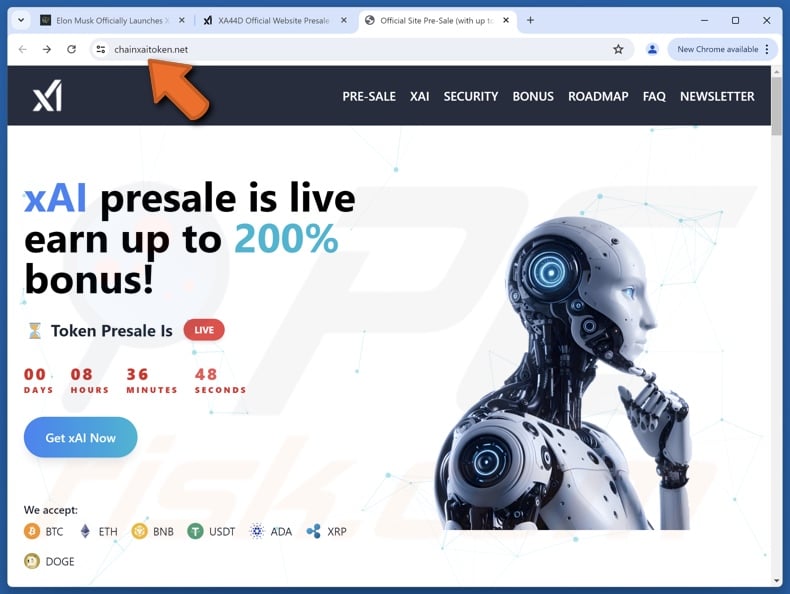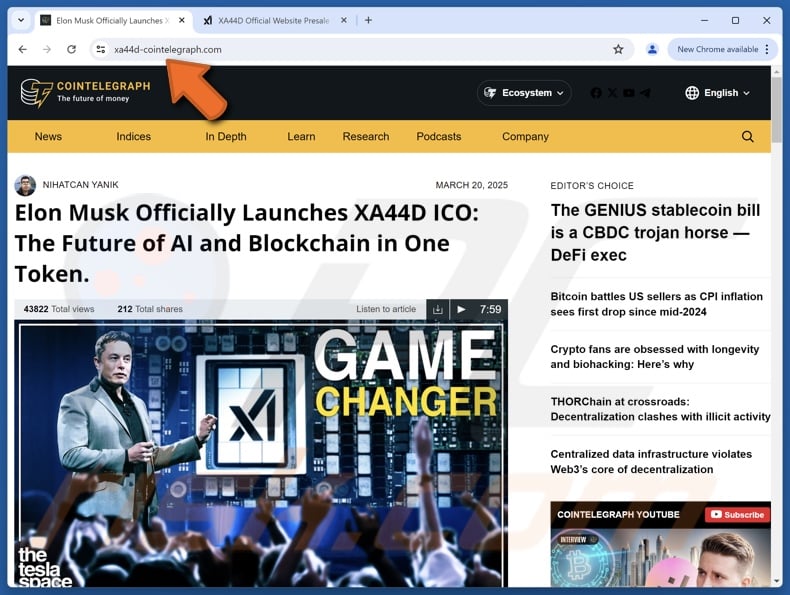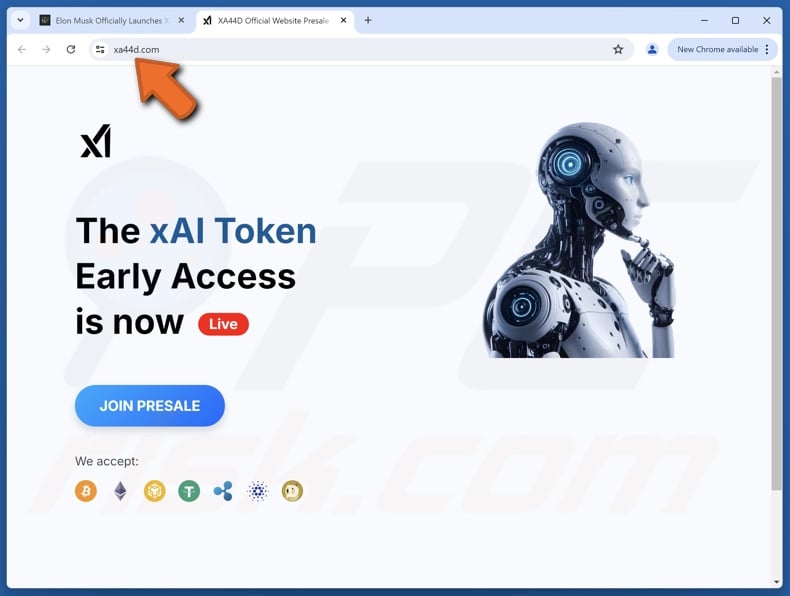How to avoid getting scammed by fake "xAI Token Launch" sites
Phishing/ScamAlso Known As: "xAI Token Launch" scam website
Get free scan and check if your device is infected.
Remove it nowTo use full-featured product, you have to purchase a license for Combo Cleaner. Seven days free trial available. Combo Cleaner is owned and operated by RCS LT, the parent company of PCRisk.com.
What is the "xAI Token Launch" scam?
"xAI Token Launch" is a scam that targets cryptocurrency. It lures users with a presale event of a new token that integrates blockchain and AI. The scam tricks users into "purchasing" the token – thus tricking them into transferring their funds to scammers for no gain.

IMPORTANT NOTE: We do not review crypto projects, please do your own research when investing money.
Federal Trade Commission (FTC) states that since the start of 2021, more than 46,000 people have reported losing over $1 billion in crypto to scams – that's about one out of every four dollars reported lost, more than any other payment method.
"xAI Token Launch" scam overview
The "xAI Token Launch" scam is promoted by a fake article on a page (xa44d-cointelegraph[.]com; potentially other domains) imitating Cointelegraph – a cryptocurrency industry news website. The scam article announces that Elon Musk has launched "XA44D" – a new token integrating blockchain and AI (Artificial Intelligence).
Early buyers of this token are promised a reduced price, and the "article" speculates on the projected cost and the increase in worth. It includes a link to the "official XA44D site" (xa44d[.]com; POT oth. URLs). This webpage is branded with xAI's logo and states that the "xAI Token" early access is live. Clicking the "JOIN PRESALE" button redirects to a different page (chainxaitoken[.]net; POT oth. URLs).
This webpage claims that buyers can earn up to a 200% bonus. Pressing the "Get xAI Now" button presents the user with a fake "SWAP" page, wherein they can buy the nonexistent token for cryptocurrencies like Bitcoin, Ethereum, Binance, Tether (USDT), Solana, Ripple, Doge, and Cardano.
It must be emphasized that this presale is fake and not associated with Elon Musk or other real public figures; X.AI Corp. or any other existing companies, projects, platforms, or entities.
By "purchasing" tokens through this scam – the victim basically transfers their digital assets to scammers. Not only do they receive no bonus and no "XA44D" tokens – they lose all the funds they send to any of the digital wallets that this scam provides.
Furthermore, cryptocurrency transactions are irreversible because of their practically untraceable nature. Therefore, victims of scams like "xAI Token Launch" cannot retrieve the stolen digital assets.
| Name | "xAI Token Launch" scam website |
| Threat Type | Phishing, Scam, Social Engineering, Fraud |
| Fake Claim | Early buyers of the XA44D token can receive an up to 200% bonus. |
| Disguise | xAI |
| Cyber Criminal Cryptowallet Addresses | bc1qhc7jyf8rmr7wpqmp5283sha424fw4ssnfc9sa0 (Bitcoin) 0xA2a89c5703aCD1170272674a22630b184Fb301de (Ethereum, Binance, Tether [USDT]) 2XqekCRjst8eNgUED5XLjAcbngxFZQePjpanHo4Z64ax (Solana) rwQmbrsYe8a6JPorZBrWX2QxBhr96Zkvu9 (Ripple) D7ekPbjNedLy6dKuVbLE66hqc3U6j7MYNt (Doge) addr1qyyn8mc56chv54utc8h7ax296795ylj475lxjajr2587 9384wchjpcwygl4q5jt3p8dx8ydlhl5zans2n5lulgxqf9hspx007s (Cardano) |
| Related Domains | xa44d-cointelegraph[.]com; xa44d[.]com; chainxaitoken[.]net |
| VirusTotal Detections and Serving IP Addresses | xa44d-cointelegraph[.]com (172.67.200.70); xa44d[.]com (104.21.27.100); chainxaitoken[.]net (104.21.76.174) |
| Distribution methods | Compromised websites, social media spam, rogue online pop-up ads, potentially unwanted applications. |
| Damage | Monetary loss |
| Malware Removal (Windows) |
To eliminate possible malware infections, scan your computer with legitimate antivirus software. Our security researchers recommend using Combo Cleaner. Download Combo CleanerTo use full-featured product, you have to purchase a license for Combo Cleaner. 7 days free trial available. Combo Cleaner is owned and operated by RCS LT, the parent company of PCRisk.com. |
Crypto scam examples
We have investigated countless online scams and found that cryptocurrency-targeting scams tend to operate in one of three ways: tricking users into manually transferring funds to scammer-owned wallets, using draining mechanisms to siphon assets from exposed wallets (drainers), and phishing for wallet log-in credentials.
While many of the scams on the Web are poorly put together and riddled with mistakes, they can be competently crafted and convincingly disguised as content associated with legitimate entities.
"Zora Vote Rewards", "$HYPSTR Vote Rewards", "ZIGChain Airdrop", "Plasma (XPL) Allocation", fake "Canton Network" website, "BNB MEME SZN (SZN) Token Distribution", and "Qace Dynamics ($QACE) Vote Rewards" are just some of our latest articles on crypto scams.
How did I open a scam website?
Online scams are primarily endorsed through malvertising (intrusive advertisements), websites using rogue advertising networks (redirects), spam (e.g., emails, browser notifications, forum/ social media posts, DMs/PMs, SMSes, cold calls/ robocalls, etc.), typosquatting (mistyped URLs), and adware (ads/redirects).
Social media spam is prevalent in crypto scam promotion; we have found many instances of this on X (more commonly known by its former name – Twitter). Promotional posts and direct/private messages can be made using hacked accounts (i.e., ones originally belonging to real projects, companies, organizations, entrepreneurs, celebrities, influencers, etc.).
Intrusive pop-up adverts are heavily used to endorse these scams as well. Some of the pop-ups are fully functional crypto drainers (i.e., capable of executing draining scripts themselves). It is noteworthy that these advertisements may be encountered on genuine sites that have been compromised.
How to avoid visiting scam websites?
Caution is key to online safety. Therefore, be wary of websites, ads, and communications that make unbelievable promises or urge you to take action against imminent threats. Pay attention to URLs and type them carefully.
Do not use sites offering pirated software/media or other questionable services (e.g., illegal streaming/downloading, Torrenting, etc.), as these webpages are typically monetized via rogue advertising networks. Be vigilant with incoming emails and other messages; do not open attachments or links found in suspicious/irrelevant mail.
Do not permit dubious webpages to display browser notifications (i.e., ignore or block these requests). Download only from official/verified sources and be attentive when installing (e.g., read terms, study options, use "Custom/Advanced" settings, and opt out of additional apps, extensions, etc.) – to prevent bundled/harmful software (like adware) from infiltrating the device.
If your computer is already infected, we recommend running a scan with Combo Cleaner Antivirus for Windows to automatically eliminate all threats.
Appearance of the "xAI Token Launch" scam (GIF):

Screenshot of a fake Cointelegraph webpage promoting the "xAI Token Launch" scam:

Screenshot of a webpage promoted by the fake article depicted above:

Instant automatic malware removal:
Manual threat removal might be a lengthy and complicated process that requires advanced IT skills. Combo Cleaner is a professional automatic malware removal tool that is recommended to get rid of malware. Download it by clicking the button below:
DOWNLOAD Combo CleanerBy downloading any software listed on this website you agree to our Privacy Policy and Terms of Use. To use full-featured product, you have to purchase a license for Combo Cleaner. 7 days free trial available. Combo Cleaner is owned and operated by RCS LT, the parent company of PCRisk.com.
Quick menu:
- What is "xAI Token Launch" scam website?
- How to identify a pop-up scam?
- How do pop-up scams work?
- How to remove fake pop-ups?
- How to prevent fake pop-ups?
- What to do if you fell for a pop-up scam?
How to identify a pop-up scam?
Pop-up windows with various fake messages are a common type of lures cybercriminals use. They collect sensitive personal data, trick Internet users into calling fake tech support numbers, subscribe to useless online services, invest in shady cryptocurrency schemes, etc.
While in the majority of cases these pop-ups don't infect users' devices with malware, they can cause direct monetary loss or could result in identity theft.
Cybercriminals strive to create their rogue pop-up windows to look trustworthy, however, scams typically have the following characteristics:
- Spelling mistakes and non-professional images - Closely inspect the information displayed in a pop-up. Spelling mistakes and unprofessional images could be a sign of a scam.
- Sense of urgency - Countdown timer with a couple of minutes on it, asking you to enter your personal information or subscribe to some online service.
- Statements that you won something - If you haven't participated in a lottery, online competition, etc., and you see a pop-up window stating that you won.
- Computer or mobile device scan - A pop-up window that scans your device and informs of detected issues - is undoubtedly a scam; webpages cannot perform such actions.
- Exclusivity - Pop-up windows stating that only you are given secret access to a financial scheme that can quickly make you rich.
Example of a pop-up scam:

How do pop-up scams work?
Cybercriminals and deceptive marketers usually use various advertising networks, search engine poisoning techniques, and shady websites to generate traffic to their pop-ups. Users land on their online lures after clicking on fake download buttons, using a torrent website, or simply clicking on an Internet search engine result.
Based on users' location and device information, they are presented with a scam pop-up. Lures presented in such pop-ups range from get-rich-quick schemes to fake virus scans.
How to remove fake pop-ups?
In most cases, pop-up scams do not infect users' devices with malware. If you encountered a scam pop-up, simply closing it should be enough. In some cases scam, pop-ups may be hard to close; in such cases - close your Internet browser and restart it.
In extremely rare cases, you might need to reset your Internet browser. For this, use our instructions explaining how to reset Internet browser settings.
How to prevent fake pop-ups?
To prevent seeing pop-up scams, you should visit only reputable websites. Torrent, Crack, free online movie streaming, YouTube video download, and other websites of similar reputation commonly redirect Internet users to pop-up scams.
To minimize the risk of encountering pop-up scams, you should keep your Internet browsers up-to-date and use reputable anti-malware application. For this purpose, we recommend Combo Cleaner Antivirus for Windows.
What to do if you fell for a pop-up scam?
This depends on the type of scam that you fell for. Most commonly, pop-up scams try to trick users into sending money, giving away personal information, or giving access to one's device.
- If you sent money to scammers: You should contact your financial institution and explain that you were scammed. If informed promptly, there's a chance to get your money back.
- If you gave away your personal information: You should change your passwords and enable two-factor authentication in all online services that you use. Visit Federal Trade Commission to report identity theft and get personalized recovery steps.
- If you let scammers connect to your device: You should scan your computer with reputable anti-malware (we recommend Combo Cleaner Antivirus for Windows) - cyber criminals could have planted trojans, keyloggers, and other malware, don't use your computer until removing possible threats.
- Help other Internet users: report Internet scams to Federal Trade Commission.
Frequently Asked Questions (FAQ)
What is an online scam?
Online scams are a type of deceptive Web content that aims to trick users into performing specific actions. For example, victims can be enticed into making monetary transactions, connecting digital wallets to crypto drainers, disclosing sensitive information, buying products, subscribing to services, downloading/installing programs, etc.
What is the purpose of online scams?
Online scams are designed to generate revenue for scammers. They predominantly profit by obtaining funds through deception, promoting content (e.g., sites, software, products, services, etc.), selling/abusing private data, and spreading malware.
I have lost digital assets to a fake "xAI Token Launch" website, can I get my money back?
Cryptocurrency transactions cannot be reversed due to their nearly untraceable nature. Therefore, victims of scams like "xAI Token Launch" cannot retrieve their funds.
Why do I encounter online scams?
The most prevalent promotional techniques include: spam (e.g., social media posts, PMs/DMs, emails, browser notifications, etc.), webpages employing rogue advertising networks, intrusive ads, misspelled URLs, and adware.
Will Combo Cleaner protect me from online scams?
Combo Cleaner can scan every website that you visit for deceptive and malicious content. It is also capable of denying all further access to sites that host such content.
Share:

Tomas Meskauskas
Expert security researcher, professional malware analyst
I am passionate about computer security and technology. I have an experience of over 10 years working in various companies related to computer technical issue solving and Internet security. I have been working as an author and editor for pcrisk.com since 2010. Follow me on Twitter and LinkedIn to stay informed about the latest online security threats.
PCrisk security portal is brought by a company RCS LT.
Joined forces of security researchers help educate computer users about the latest online security threats. More information about the company RCS LT.
Our malware removal guides are free. However, if you want to support us you can send us a donation.
DonatePCrisk security portal is brought by a company RCS LT.
Joined forces of security researchers help educate computer users about the latest online security threats. More information about the company RCS LT.
Our malware removal guides are free. However, if you want to support us you can send us a donation.
Donate
▼ Show Discussion